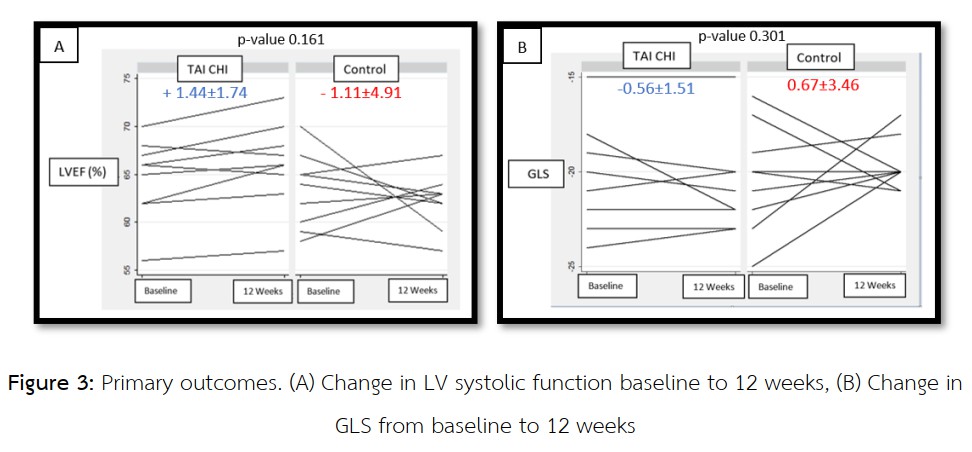Effects of Taichi and Cardiac Health, Ejection Fraction among Cancer Patients: A Pilot Study (TICHEFCAP)
Keywords:
Tai chi, GLS, LV systolic function, Chemotherapy, Cancer patientsAbstract
Background: A particular chemotherapy, such as Adriamycin or Trastuzumab, has been reported to cause worsening cardiac functions. Previous studies showed that Tai chi may enhance some favorable cardiovascular effects with a better quality of life. Nonetheless, there is inadequate evidence to prove Tai chi as a standard of care for cardiac health, and ejection fraction, especially in cancer patients. Objective: To investigate the effects of Tai chi for cardiac health and ejection fraction in cancer patients. Methods: A single-blinded, non-randomized controlled trial was conducted in 30 cancer patients who were sent for echocardiogram before receiving either Adriamycin or Trastuzumab and allocated into either Tai chi or control group. Primary outcomes were LV systolic function and global longitudinal strain (GLS) measured by one blinded cardiologist. Whilst, secondary outcomes included the quality of life measurement by FACT-G score and distress thermometer scale. Results: Data of 18 cancer patients were analyzed (9 patients in each group). For primary outcomes, LV systolic function was increased by 1.44±1.74 % in Tai chi group and decreased by 1.11±4.91 % in control group (p-value = 0.161). When adjusted for confounding factor, the Tai chi group had 4.37% improvement in LV systolic function when compared with the control group (p=0.087). Whereas, GLS was improved by 0.56±1.51 in the Tai chi group and worsened by 0.67±3.46 in the control group (p-value = 0.301). Tai chi also yielded a better quality of life demonstrated by higher post treatment FACT G score (5.25±16.21 in the Tai chi group and 2.56±5.85 in the control group, p-value = 0.647). Nonetheless, distress thermometer scale was lower in the Tai chi group, with the difference of 0.56±2.79 in the tai chi group and -0.11±1.54 in the control group (p-value = 0.538). Conclusion: Tai chi demonstrates favorable outcomes in the improvement of cardiac function (LV systolic function and GLS), with trend of higher quality of life among cancer patients receiving cardiotoxic chemotherapy agents.
Downloads
References
Zamorano JL, Lancellotti P, Rodriguez Muñoz D, et al. 2016 ESC Position Paper on cancer treatments and cardiovascular toxicity developed under the auspices of the ESC Committee for Practice Guidelines The Task Force for cancer treatments and cardiovascular toxicity of the European Society of Cardiology (ESC). Eur Heart J. 2016;37(36):2768-2801. doi:10.1093/eurheartj/ehw211
Singh A, Voss WB, Lentz RW, Thomas JD, Akhter N. The Diagnostic and Prognostic Value of Echocardiographic Strain. JAMA Cardiol. 2019;4(6):580-588. doi:10.1001/jamacardio.2019.1152
Lenneman Carrie G., Sawyer Douglas B. Cardio-Oncology. Circ Res. 2016;118(6):1008-1020. doi:10.1161/CIRCRESAHA.115.303633
Haddadzadeh MH, Maiya AG, Padmakumar R, Shad B, Mirbolouk F. Effect of exercise-based cardiac rehabilitation on ejection fraction in coronary artery disease patients: A randomized controlled trial. Heart Views. 2011;12(2):51. doi:10.4103/1995-705X.86013
Chen Y-W, Hunt MA, Campbell KL, Peill K, Reid WD. The effect of Tai Chi on four chronic conditions—cancer, osteoarthritis, heart failure and chronic obstructive pulmonary disease: a systematic review and meta-analyses. Br J Sports Med. 2016;50(7):397-407. doi:10.1136/bjsports-2014-094388
Fong SSM, Wong JYH, Chung LMY, et al. Changes in heart-rate variability of survivors of nasopharyngeal cancer during Tai Chi Qigong practice. J Phys Ther Sci. 2015;27(5):1577-1579. doi:10.1589/jpts.27.1577
Huston P, McFarlane B. Health benefits of tai chi: What is the evidence? Can Fam Physician. 2016;62(11):881-890.
Yeh GY, Wood MJ, Lorell BH, et al. Effects of tai chi mind-body movement therapy on functional status and exercise capacity in patients with chronic heart failure: a randomized controlled trial. Am J Med. 2004;117(8):541-548. doi:10.1016/j.amjmed.2004.04.016
Lan C, Chen S-Y, Wong M-K, Lai JS. Tai Chi Chuan Exercise for Patients with Cardiovascular Disease. Evid-Based Complement Altern Med ECAM. 2013;2013. doi:10.1155/2013/983208
Klein P. Qigong in Cancer Care: Theory, Evidence-Base, and Practice. Med Basel Switz. 2017;4(1). doi:10.3390/medicines4010002
Hartley L, Flowers N, Lee MS, Ernst E, Rees K. Tai chi for primary prevention of cardiovascular disease. Cochrane Database Syst Rev. 2014;(4). doi:10.1002/14651858.CD010366.pub2
Fong SSM, Liu KPY, Luk WS, Leung JCY, Chung JWY. Tai Chi Qigong for survivors of breast cancer: a randomised controlled trial. The Lancet. 2017;390:S32. doi:10.1016/S0140-6736(17)33170-7
Carlson LE, Zelinski EL, Speca M, et al. Protocol for the MATCH study (Mindfulness and Tai Chi for cancer health): A preference-based multi-site randomized comparative effectiveness trial (CET) of Mindfulness-Based Cancer Recovery (MBCR) vs. Tai Chi/Qigong (TCQ) for cancer survivors. Contemp Clin Trials. 2017;59:64-76. doi:10.1016/j.cct.2017.05.015
Mustian KM, Palesh OG, Flecksteiner SA. Tai Chi Chuan for Breast Cancer Survivors. Tai Chi Chuan. 2008;52:209-217. doi:10.1159/000134301
Smith L, Gordon D, Scruton A, Yang L. The potential yield of Tai Chi in cancer survivorship. Future Sci OA. 2016;2(4):FSO152. doi:10.4155/fsoa-2016-0049
Broom R, Du H, Clemons M, et al. Switching Breast Cancer Patients with Progressive Bone Metastases to Third-Generation Bisphosphonates: Measuring Impact Using the Functional Assessment of Cancer Therapy-Bone Pain. J Pain Symptom Manage. 2009;38(2):244-257. doi:10.1016/j.jpainsymman.2008.08.005
Ratanatharathorn V, Sirilerttrakul S, Jirajarus M, et al. Quality of life, Functional Assessment of Cancer Therapy-General. J Med Assoc Thail Chotmaihet Thangphaet. 2001;84(10):1430-1442.

Downloads
Published
How to Cite
Issue
Section
License
Copyright and Disclaimer
Articles published in this journal are the copyright of Chulabhorn Royal Academy.
The opinions expressed in each article are those of the individual authors and do not necessarily reflect the views of Chulabhorn Royal Academy or any other faculty members of the Academy. The authors are fully responsible for all content in their respective articles. In the event of any errors or inaccuracies, the responsibility lies solely with the individual authors.


